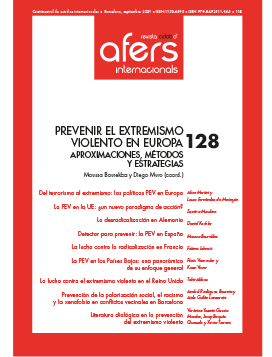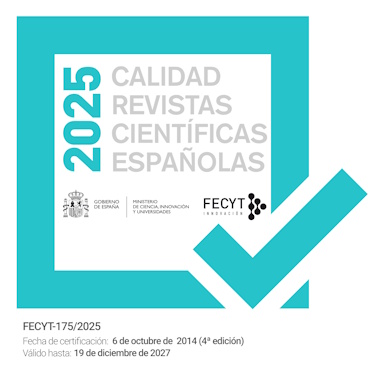Dialogic literature for preventing violent extremism (PVE): Ustaša hate speech
Keywords:
preventing violent extremism (PVE), radicalisation, Ustaša, literature, education, anti-rumour strategy, dialogic policy, hate speechAbstract
Revista CIDOB d’Afers Internacionals, n. 128
Quadrimestral (May-September 2021)
ISSN:1133-6595 - E-ISSN:2013-035X
DOI: doi.org/10.24241/rcai.2021.128.2.201
The underlying dynamics of the various kinds of extremism have, as a common feature, exclusion of the other through hate speech. One of the keys for preventing violent extremism (PVE) is working from the domain of public policy to combat the prejudices and stereotypes that shape discriminatory discourse. This study presents a project of education through literature in the framework of UNESCO’s PVE strategy. This proposal is constructed around a specific European case, Ustaša violence, which has allowed identification of three relevant areas when developing the PVE strategy: historical, literary, and dialogic. With a view to favouring human rights, the aim is to design public policies which, with a social impact in the domain of PVE, will consolidate recognition of the equal dignity of human beings.
>> The full text articles are available in Spanish language, although in this issue some of them are also available in English language.
References
Aiello, Emilia; Puigvert, Lidia y Schubert, Tinka. «Preventing violent radicalization of youth through dialogic evidence-based policies». International Sociology, vol. 33, n.° 4 (2018), p. 435-453.
Alegre, David. "El Estado Independiente de Croacia (NDH): encrucijada de imperios, violencias, comunidades nacionales y proyectos revolucionarios (1941-42)". En: Rodrigo, Javier (ed.). Políticas de la violencia. Europa, siglo XX. Zaragoza: Prensas de la Universidad de Zaragoza, 2014, p. 191-239
Álvarez, Gemma; Aiello, Emilia; Aubert, Adriana; García, Tania, Torrens, Xavier y Vieites, Maria. «The Dialogic Public Policy: A Successful Case». Qualitative Inquiry, vol. 26, n.° 8-9 (2020), p. 1.041-1.047.
Andrić, Ivo. Café Titanic (y otras historias). Barcelona: Acantilado, 2008.
Bakic, Dragan. «Milan Stojadinovic, the croat question and the international position of Yugoslavia, 1934-1939». Acta Histriae, vol. 26, n.° 1 (2018), p. 207-228.
Balic, Emily. «When Croatia needs serbs: nationalism and genocide in Sarajevo, 1941-1942». Slavic Review, vol. 68, n.° 1 (2009), p. 116-138.
Banerjee, Abhijit V. y Duflo, Esther. Buena economía para tiempos difíciles. Madrid: Taurus, 2020.
Barzelay, Michael. Public management as a design-oriented professional discipline. Cheltenham: Edward Elgar Publishing, 2019.
Bauer, Yehuda. Rethinking the Holocaust. Harrisonburg: Yale University, 2001.
Bergholz, Max. Violence as a Generative Force: Identity, Nationalism, and Memory in a Balkan Community. Ithaca NY: Cornell University Press, 2016.
Casanova, Julián. Una violencia indómita. Barcelona: Crítica, 2020.
Ćatović, Vedran. «The Small-Town Globalism of Ivo Andrić». Journal of World Literature, n.º 4 (2019), p. 394-410.
Compagnon, Antoine. ¿Para qué sirve la literatura? Barcelona: Acantilado, 2008.
Dawidowicz, Lucy S. The War Against the Jews, 1933-1945. Nueva York: Bantam Books, 1975.
Delibasic, Savo. «Varieties of Psychopathological Behaviour among the Ustashe at Jasenovac». En: Lituchy, Barry (ed.). Jasenovac and the Holocaust in Yugoslavia. Nueva York: Jasenovac Research Institute, 2006, p. 230-237.
Djokic, Dejan. Histories of a failed idea, 1918-1992. Londres: Hurst & Company. 2003.
Dwork, Debórah y Van Pelt, Robert Jan. Holocausto. Una historia. Madrid: Algaba, 2004.
Emcke, Carolin. Contra el odio. Barcelona: Taurus, 2017.
Friedländer, Saul. El Tercer Reich y los judíos (1939-1945). Barcelona: Galaxia Gutenberg, 2009.
Glucksmann, André. El discurso del odio. Madrid: Taurus, 2005.
González Cussac, José Luis y Flores Giménez, Fernando. «Seguridad global y derechos fundamentales. Una propuesta metodológica». En: González Cussac, José Luis y Flores Giménez, Fernando (coords.). Seguridad y derechos. Valencia: Tirant lo Blanch, 2018, p. 26-98.
Gumz, Jonathan E. «Wehrmacht Perceptions of Mass Violence in Croatia, 1941-1942». The Historical Journal, vol. 44, n.° 4 (2001), p. 1.015-1.038.
Gutman, Israel. Holocausto y memoria. Jerusalén: Yad Vashem, 2003.
Habermas, Jürgen. Teoría de la acción comunicativa. Madrid: Trotta, 2010.
Hilberg, Raul. La destrucción de los judíos europeos. Madrid: Akal, 2005.
Hunt, Lynn. La invención de los derechos humanos. Barcelona: Tusquets, 2009 [2007].
Huntington, Samuel. El choque de civilizaciones. Ciudad de México: FCE, 1997.
Huster, Stefan. Terrorismo y Derechos Fundamentales. Madrid: Fundación Coloquio Jurídico Europeo, 2010.
Kahneman, Daniel. Pensar rápido, pensar despacio. Barcelona: Debate, 2012.
Manzini, Ezio. Cuando todos diseñan. Getafe: Experimenta, 2015.
Mate, Reyes. «La memoria, principio de la justicia». Ars Brevis: anuario de la Càtedra Ramon Llull Blanquerna, n.° 12 (2012), p. 100-110.
McCormick, Robert. Croatia Under Ante Pavelić: America, the Ustase and Croatian Genocide. Londres y Nueva York: Tauris, 2014.
Moore, Mark H. Gestión estratégica y creación de valor en el sector público. Barcelona: Paidós, 1998.
Naciones Unidas. «Plan de Acción para Prevenir el Extremismo Violento. Informe del Secretario General». Asamblea General de Naciones Unidas, A/70/674 (24 de diciembre de 2015) (en línea) [Fecha de consulta: 21.11.2020] https://undocs.org/es/A/70/674
Naciones Unidas. «La moderación». Asamblea General de Naciones Unidas, A/RES/72/129 (15 de enero de 2018) (en línea) [Fecha de consulta: 21.11.2020] https://undocs.org/es/A/RES/72/129
Nussbaum, Martha. El cultivo de la humanidad. Barcelona: Paidós, 2005 [1997].
Nussbaum, Martha. Crear capacidades. Barcelona: Paidós, 2012.
Nussbaum, Martha. Emociones políticas. Barcelona: Paidós, 2014.
Nussbaum, Martha. La monarquía del miedo. Barcelona: Paidós, 2019.
Osborne, David y Plastrik, Peter. The Reinventors Fielbook. Nueva York: Jossey Bass, 2000.
Pinker, Steven. Los ángeles que llevamos dentro. Barcelona: Paidós, 2012.
Ramet, Sabrina. «The NDH: A Introduction». Totalitarian Movements, and Political Religions, vol. 7, n.° 4 (2006), p. 399-408.
Rees, Laurence. El Holocausto. Barcelona: Crítica, 2017.
Robinson, Ken. El elemento. Barcelona: Conecta, 2012.
Sachar, Howard. The Assassination of Europe, 1918-1942: A Political History. University of Toronto Press, 2015.
Sadkovich, James. «Terrorism in Croatia, 1929–1934». East European Quarterly, vol. 22, n.° 1 (1988), p. 55-79.
Schmitt, Carl. El concepto de lo político. Madrid: Alianza Editorial, 2009 [1932].
Schwarz, Géraldine. Los amnésicos. Barcelona: Tusquets, 2020 [2017].
Sen, Amartya. La idea de justicia. Madrid: Taurus, 2009.
Sigman, Mariano. La vida secreta de la mente. Barcelona: Debate, 2016.
Snyder, Timothy Tierra negra. Barcelona: Galaxia Gutenberg, 2015.
Steinberg, Jonathan All or Nothing. The Axis and the Holocaust, 1941-43. Londres: Routledge, 2003.
Sunstein, Cass (más) Simple. Madrid: Marcial Pons, 2014.
UNESCO. «La Función de la UNESCO en la promoción de la educación como instrumento para prevenir el extremismo violento». UNESCO Consejo Ejecutivo, Decisión 197 EX/46 (7 de octubre de 2015b[A7] ) (en línea) [Fecha de consulta: 21.11.2020] https://unesdoc.unesco.org/ark:/48223/pf0000234879_spa
UNESCO. «La UNESCO en acción. Prevenir el extremismo violento en todo el mundo». (2017) (en línea) [Fecha de consulta: 21.11.2020] https://en.unesco.org/sites/default/files/unesco_in_action-pve_worldwide-sp.pdf
UNESCO. «Constitución de la Organización de las Naciones Unidas para la Educación, la Ciencia y la Cultura». (1945) (en línea) [Fecha de consulta: 21.11.2020] https://unesdoc.unesco.org/ark:/48223/pf0000372956_spa/PDF/372956spa.pdf.multi.page=7
UNESCO. «Función y responsabilidades de la UNESCO en la realización de la educación para la ciudadanía mundial y la promoción de la educación para la paz y los derechos humanos y la educación para el desarrollo sostenible». UNESCO Consejo Ejecutivo, Decisión 196 EX/32 (2 de abril de 2015a).
Yeomans, Rory. «Eradicating "Undesired Elements": National Regeneration and the Ustasha Regime's Program to Purify the Nation, 1941-1945». En: Weiss-Wendt, Anton y Yeomans, Rory (eds.). Racial Science in Hitler's New Europe, 1938-1945. Lincoln: University of Nebraska Press, 2013, p. 200-236.













